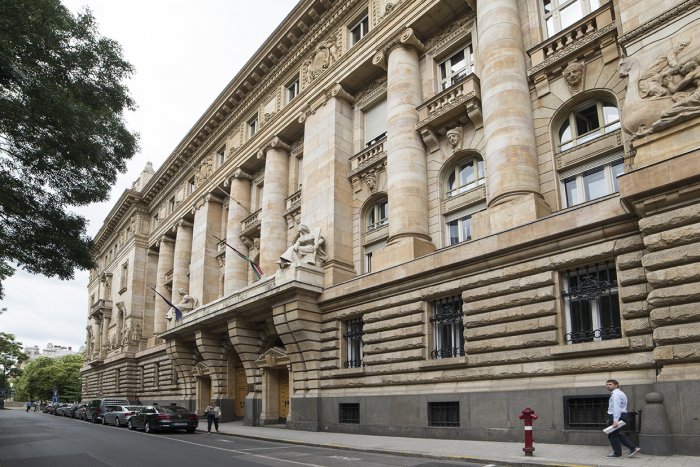MNB reaches for unconventional monetary policy tools

MNB headquarters in Budapest (Image by Jessica Fejos)
The Monetary Council of the National Bank of Hungary (MNB) has decided to introduce two unconventional monetary policy tools from January 2018, the council said in a statement on the central bankʼs website after yesterdayʼs rate-setting meeting. As expected, the council also decided to keep the key rate on hold at 0.90%.
One of the two unconventional policy tools will be an unconditional five-year and ten-year interest rate swap (IRS) instrument, with a limit amount of HUF 300 billion for the first quarter of 2018. The IRS instrument will be accessible to partner banks through tenders held regularly from January 1, 2018.
In addition, the central bank will also launch a targeted program to purchase 3-year or longer-term mortgage bonds, the Monetary Council said in the statement.
The MNB will make a decision on the operational details of the programs in December 2017.
The MNB said it introduced the tools because the curve for long-term yields in the government securities and interbank markets was still steep in international comparison, even though the difference between short and long-term yields has narrowed recently.
The council considers it important that loose monetary conditions have their effect also at the longer end of the yield curve. It added that the two unconventional instruments will constitute an integral part of its set of monetary policy instruments.
The council also noted that the gradual limitation on the stock of three-month deposits has fulfilled its role and the HUF 75 bln year-end upper limit on the stock will not be reduced further.
The importance of the stock and maturity structure of central bank swap instruments providing forint liquidity will increase and the council will decide on the amount of liquidity crowded out on a regular frequency and will adjust the stock of central bank swap instruments accordingly.
In the councilʼs assessment, some degree of unused capacity has remained in the economy. The inflation target is expected to be achieved in a sustainable manner by the middle of 2019, it added, noting that the base rate and loose monetary conditions need to be maintained for an extended period to achieve this.
The council said it will closely monitor developments in monetary conditions and will ensure the persistence of loose monetary conditions over a prolonged period by using the extended set of monetary policy instruments.
Also on Tuesday, the council left the O/N central bank deposit rate at -0.15% and the O/N collateralized loan rate at 0.90%, as expected. The council has left the base rate on hold since signalling an end to an easing cycle at a policy meeting in the spring of 2016. However, rate-setters have already made use of "unconventional, targeted" instruments to ease monetary policy further.
Meeting to discuss conditions
At a press conference late yesterday afternoon, MNB Deputy Governor Márton Nagy announced that the central bank will hold a meeting next week with experts of commercial banks to discuss the conditions for introducing the two new unconventional tools.
Nagy noted that the new tools are not for promoting increased lending but for lowering yields and improving the quality of banksʼ loans. The deputy governor noted that of previous IRS facilities, HUF 390 bln will expire next year and a further HUF 1.3 trillion in 2019, with the new IRS program designed to partially replace the old ones.
Nagy added that the mortgage bond purchase program will be capped at 50% of the total stock of forint-denominated bonds. At par value there are HUF 850 bln mortgage bonds on the market, which are worth HUF 900 bln at market value, so that purchases would involve around HUF 500 bln of bonds.
The MNB would also like to lower the yields on mortgage bonds, making credit cheaper, Nagy added. In Hungary, premiums on mortgage bonds range from 50 to 60 basis points, while in some EU countries there is no premium or yields are negative.
SUPPORT THE BUDAPEST BUSINESS JOURNAL
Producing journalism that is worthy of the name is a costly business. For 27 years, the publishers, editors and reporters of the Budapest Business Journal have striven to bring you business news that works, information that you can trust, that is factual, accurate and presented without fear or favor.
Newspaper organizations across the globe have struggled to find a business model that allows them to continue to excel, without compromising their ability to perform. Most recently, some have experimented with the idea of involving their most important stakeholders, their readers.
We would like to offer that same opportunity to our readers. We would like to invite you to help us deliver the quality business journalism you require. Hit our Support the BBJ button and you can choose the how much and how often you send us your contributions.








